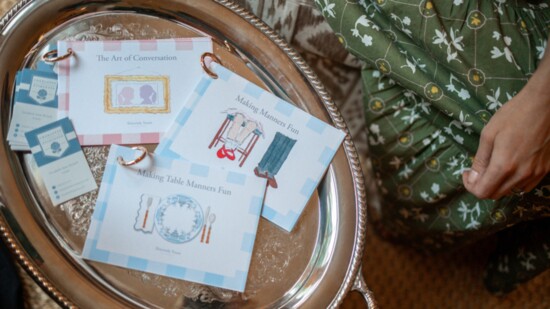Children in Elizabeth Anne Russell’s etiquette classes learn to eat soup with a bowl of melted ice cream. They practice “sticky eyes” when they meet a new person. They take small bites of crackers, keeping their lips tight, because, “Shhh, food is a secret,” Russell reminds.
She lets children as young as 5 use china that belonged to her mother. If something breaks? "I'll be ready for it," she says.
“I emphasize with the kids, 'This is beautiful,'” she said. "'But the most beautiful part is the person across the table from you.'”
The Charlotte School of Etiquette is Russell's way of carrying on a tradition passed down by her mother and grandmother. She discusses the meaning it holds, what she focuses on and ideas for teaching gratitude during the holidays.
Teaching etiquette runs in your family?
My grandmother taught etiquette for 30 years. My mom was an etiquette teacher. In 1979, she founded the National League of Junior Cotillion. She trained women across the country to start their own cotillion programs, which are half ballroom dance, half etiquette and usually geared toward middle school students. Thousands of students went through those programs. That was her heart, her life's work.
How did she create a network so large?
She was the most amazing woman. She loved getting to know people, very charismatic, so kind, and a really savvy business mind. She loved to empower women to start businesses … She passed away from cancer when I was in college. I was able to care for her the last year of her life, which was an honor and amazing.
How did you decide to follow in her footsteps?
When I graduated from college, I went into management consulting...As I've gotten older and had my own children, I was looking for something more purpose-driven and meaningful. I've always thought I'd go back to something like my mom did. Teaching life skills and etiquette can have a lasting impact on kids and our community.
How did you find your way back?
Last November, a friend invited Amy Rainer to come from Birmingham to teach an etiquette class to kids here, and she invited my daughter Anne. I was so excited. The day of the class (the hostess) texted the group, ‘My husband is sick. Can anyone else host today?’ I raised my hand. That afternoon, Amy Rainer knocked on my front door and I formed a connection with her. We stayed in touch, and she decided to start licensing her program. I felt like, ‘This is it.’ That was in May. By June, I was teaching our first class.
What are the tenets you teach?
We start with introductions and first impressions. How are we standing when we meet someone new? We talk about eye contact. Using a strong voice. Our smile. We talk about handshakes. I believe at 5 years old, they can start shaking hands and we practice that. We focus on some basics of table etiquette. I want everyone to know how to set the table after they've been through one of my courses.
How do you teach gratitude?
We have a mock birthday party, and we talk about what it means to receive a gift graciously. I have them unwrap a lemon. We go around the room, and I'll pick someone to be first and we always get a good laugh. We talk about "It's not about what it is. It's about the person who thought about you. How can you graciously acknowledge them?" You want to be honest and also kind. We can say, "Wow, this is really yellow" or "This is heavy. Thank you for thinking of me.”
Is writing thank you notes a lost art?
The handwritten note is so powerful. It's a great way to express gratitude. There's a difference between being polite and showing gratitude. Polite is saying thank you; gratitude is "I’m going to tell you why I'm thankful."
How do you teach children to write thank you notes?
We stretch our thank you by being specific. If the gift is a teddy bear, we could say, "Thank you, Aunt Susan, for the teddy bear. I love the red ribbon. It's so soft." Describe what you like about it, or how you're going to use it, which is fun with kids. They might say “a lemon is fun to throw in the backyard” or "I can't wait to squeeze it and put it in my drink."
How have children responded? Do they come begrudgingly?
The first day of classes, they're a little hesitant. By class two, moms text me or come to the door and say, "That was the best part of their day yesterday," or "They had so much fun they couldn't wait to come back." I had a mom text me that her girls got up early to put their dresses on and wanted to wear lip gloss to come to class.
And the boys?
I was out in public, and one of the little boys from my class ran in front of me to open the door for me.
